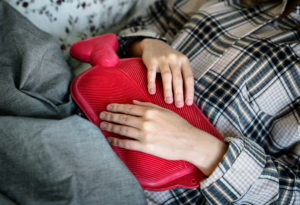Premenstrual syndrome, called PMS for short, is a term used to represent a collection of physical and emotional symptoms women experience 1-2 weeks before their period. However, some symptoms are normal, and others are not, and PMS is difficult to deal with for many women. You don’t have to suffer through challenging or extreme PMS symptoms every month. If you don’t understand it and how it affects our behavior, you’ve come to the right place. Read on to learn more about what it does to women, how it changes the way we act, and what to do about it.
Symptoms of PMS
Premenstrual syndrome begins with hormonal changes in anticipation of menstruation. Both estrogen and progesterone drop, which also causes serotonin to drop. Meanwhile, luteinizing hormone and follicle-stimulating hormone increase. Hence, women often experience a combination of either of the following symptoms:
- Emotional: Mood swings, irritability, anxiety, depression, loss of confidence, anger
- Abdominal: Bloating, cramping
- Gastrointestinal: Nausea, gas, diarrhea, or constipation
- Pain and tenderness: Back, abdomen, pelvis, muscles, joints, breasts
- Whole body: Fatigue, loss of appetite or excessive hunger
- Other: Acne, headache, insomnia, weight gain, difficulty concentrating
Behavioral changes caused by PMS
The neurotransmitter serotonin is important for regulating your mood, appetite, and sleep cycle. You know it informally as the happy chemical because it regulates anxiety and decreases depression. While women experience a degree of physical discomfort, depression, and anxiety during their periods, it is the week or two before menstruation starts when certain symptoms are at a high.
When that happens, there are emotional changes. Women can experience any combination of anxiety, depression, anger, irritability, mood swings, fatigue, difficulty concentrating, loss of confidence, or cravings. Since the mind affects our mood and how we act, the symptoms result in behavioral changes during that time.
To that end, there are aspects of behavior that are unique to different stages of the menstrual cycle. Each affects cognition and emotion and are not permanent changes in women’s psyche, but transient. These aspects are important when considering gender differences in brain structure and metabolism. Such differences in brain structure correspond to behavioral differences.
What’s normal for PMS and what’s not
The symptoms before menstruation comes can range from mild to severe, with most women experiencing moderate symptoms. On the other hand, it is not normal to experience symptoms at the extreme end of the spectrum. Women who do so experience a higher incidence of personality and other disorders, including anxiety, panic, obsessive-compulsive personality, and any one of dramatic personalities. 5% to 8% of women have moderate-to-severe symptoms that can create much distress and impair daily living.
Anxiety disorder is distinguished from panic disorder by the absence of extreme anxiety leading to panic attacks. Obsessive-compulsive disorder involves intrusive thoughts compelling someone to repeat specific routines to the point where it causes distress and impairs daily life, while dramatic personality disorders are a cluster of disorders which include Antisocial, Borderline, Histrionic, and Narcissistic Personality Disorder.
On the other hand, it was discovered that women in a large meta-analysis (a study which compares several studies) of bipolar disorder had some unique challenges. 44% to 68% of the women had some mood changes from premenstrual syndrome, 25% to 77% fit the criteria for premenstrual dysphoria, and 15% to 27% fit the criteria for premenstrual dysphoric disorder (PMDD).
Imbalance of hormones causing any one of the following issues can also induce severe premenstrual syndrome symptoms:
- Endometriosis, a disorder in which the tissue lining the uterus (the endometrium) grows outside of it
- Polycystic ovarian syndrome (PCOS), an endocrine disorder in which women experience long or infrequent periods or excessive male hormone (androgen) levels, named after the cysts which grow on the ovaries as a result
- Uterine fibroids, noncancerous growths inside the uterus
How to manage the symptoms
If you are having a hard time dealing with your symptoms, don’t despair. There are many things you can do to lessen their effects, so you don’t have to be stuck waiting for your period to start for them to subside.
Dietary changes to ease into premenstrual syndrome can lessen your symptoms. Limiting salt, sugar, sugary and salty foods, caffeine, and alcohol, and drinking plenty of water will minimize water weight and bloating. Also, eating fruits and vegetables and foods rich in calcium and iron can actually lower your symptoms, with iron lowering them by as much as 33%. Exercising throughout the month and taking supplements can minimize your symptoms as well as reduces your stress. It is good to find additional ways to reduce stress for when you can’t or don’t want to exercise, meditation being just one example. Getting enough sleep and not smoking are also important.
For those women who are experiencing severe pain or bleeding, it is necessary to track your symptoms and visit a doctor. Asking for a blood panel will determine if there are any hormonal imbalances or nutritional deficiencies, while a pap smear will check for any abnormalities of the reproductive organs. You may need birth control pills and/or antidepressants to help manage your symptoms in addition to other treatment options.
There are also online support groups for women experiencing depression, PMDD and other conditions. Such groups can give you the positive encouragement you need in your situation.
Premenstrual syndrome symptoms end before a period begins, and they are a normal part of every woman’s monthly menstruation. Moderate symptoms can distract women from functioning to their fullest, and severe symptoms take away from their quality of life. When you know the range of normal symptoms and how to deal with your own, you are empowering yourself to have a much smoother menstruation cycle.











thanks